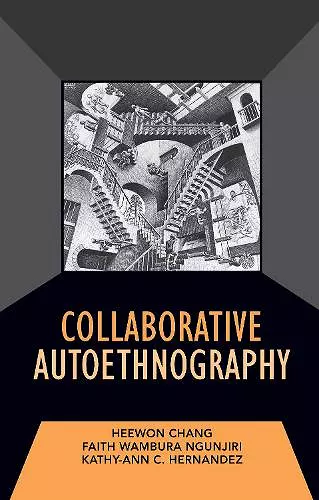Collaborative Autoethnography
Heewon Chang author Faith Ngunjiri author Kathy-Ann C Hernandez author
Format:Hardback
Publisher:Left Coast Press Inc
Published:15th Dec '12
Currently unavailable, and unfortunately no date known when it will be back
This hardback is available in another edition too:
- Paperback£37.99(9781598745566)

It sounds like a paradox: How do you engage in autoethnography collaboratively? Heewon Chang, Faith Ngunjiri, and Kathy-Ann Hernandez break new ground on this blossoming new array of research models, collectively labeled Collaborative Autoethnography. Their book serves as a practical guide by providing you with a variety of data collection, analytic, and writing techniques to conduct collaborative projects. It also answers your questions about the bigger picture: What advantages does a collaborative approach offer to autoethnography? What are some of the methodological, ethical, and interpersonal challenges you’ll encounter along the way? Model collaborative autoethnographies and writing prompts are included in the appendixes. This exceptional, in-depth resource will help you explore this exciting new frontier in qualitative methods.
"Collaborative autoethnography (CAE) is a relatively new qualitative social inquiry method that utilizes ethnography, autobiography, and researcher collaboration. CAE goes beyond autoethnography, a methodology in which researchers collect data from their own life stories and examine it within sociocultural contexts. Chang previously wrote Autoethnography as Method (CH, Mar'09, 46-3928). Multi-researcher CAE takes place collectively and cooperatively within teams ranging from two to a dozen, allowing for self- and collective analysis. The authors (all, Eastern Univ.) here present a cogent and practical guide to the collaborative process. Clearly delineated chapters explain CAE and its benefits and challenges; project typologies; project preparation, including team formation and determining researcher roles and research focus; data collection and interpretation; writing; and applications. Diagrams, extensive references, and a sample list of writing prompts for self-reflective data collection contribute to the volume's usefulness. In the epilogue, the authors describe their recent CAE research project. The appendix includes a reprint of a 2010 article by seven authors who examined mothering, using CAE methodology. As a relatively recent field of social inquiry, CAE previously was the subject of articles only. This volume provides a clearly articulated explanation of CAE and step-by-step guide to conducting research. Summing Up: Highly recommended. Upper-division undergraduates and above." --CHOICE
ISBN: 9781598745559
Dimensions: unknown
Weight: 440g
200 pages